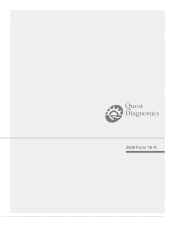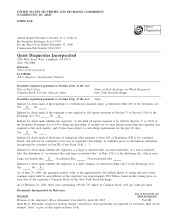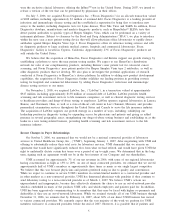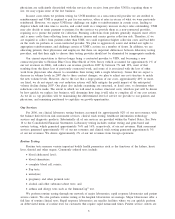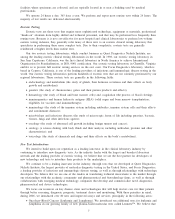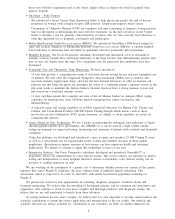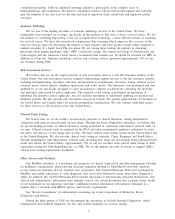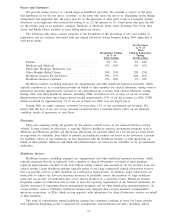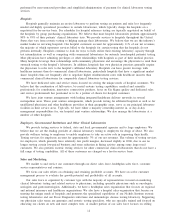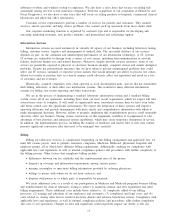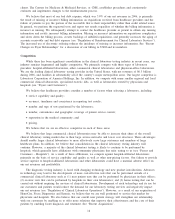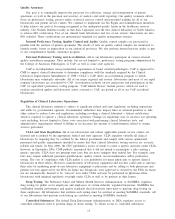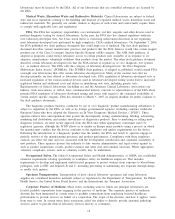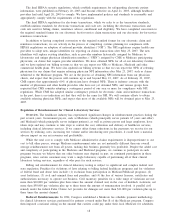Quest Diagnostics 2006 Annual Report Download - page 29
Download and view the complete annual report
Please find page 29 of the 2006 Quest Diagnostics annual report below. You can navigate through the pages in the report by either clicking on the pages listed below, or by using the keyword search tool below to find specific information within the annual report.
these tests will first supplement and, in the future, might reduce or replace the need for painful bone
marrow biopsies.
•Oncology – Solid Tumors:
- We introduced a breast Cancer Gene Expression Index to help physicians predict the risk of disease
recurrence in women with estrogen receptor (ER)-positive, lymph node-negative breast cancer.
- Carcinomas of Unknown Primary (CUP) are expensive and time consuming to diagnose, losing precious
time for the patient in determining the most effective treatment. As the first laboratory in the United
States to develop a test for genomic characterization of tumor cells, we were also the first laboratory to
offer this important test to hospitals, oncologists and pathologists.
•Methicillin-Resistant Staphylococcus aureus (MRSA). We introduced GeneOhm’s PCR-based testing for
rapid and accurate diagnosis of Methicillin-Resistant Staphylococcus aureus (MRSA), a virulent hospital-
based infection, to determine how and when to quarantine and treat potentially affected patients.
•Multiple Sclerosis. Our Focus Diagnostics subsidiary developed and introduced a test to determine if
multiple sclerosis patients have developed antibodies to the drug Tysabri, thus differentiating patients who
may or may not benefit from the drug. Two companion tests for interferon beta antibodies were also
developed.
•Transplant Care and Therapeutic Drug Monitoring. We have introduced:
- 14 tests that provide a comprehensive menu of infectious disease testing for pre and post transplant care
of patients. We also offer the companion therapeutic drug monitoring (TDM) tests to monitor anti-
rejection (immune suppression) drugs, and were the first national laboratory to offer an immune cell
function test that helps the physician determine the status of a transplant patient’s immune system as the
physician works to maintain the delicate balance between rejection from a strong immune system and
infection from a weakened immune system.
- 11 tests and three panels that complete our state of the art Human Leukocyte Antigen (HLA) typing
capability for hematopoietic stem cell/bone marrow transplantation, tumor vaccination, and
immunotherapy.
- A nine-test menu and testing capability in an FDA registered laboratory for Human Cell, Tissues and
Cellular and Tissue-Based Products (HCT/P) Donor Testing through which donors (such as those
involved in in-vitro fertilization (IVF), sperm donations, or cellular or tissue implants) are tested for
communicable diseases.
•Assays Based on New Technology. We are a leader in improving the techniques and utilization of liquid
chromatography-tandem mass spectrometry (LC-MS/MS) so it can be used in a high-volume routine
testing environment for improved testing, monitoring and treatment of patients with steroidal and hormonal
conditions.
Using this platform, we developed and introduced a more accurate and sensitive 25-OH Vitamin D assay
as well as a testosterone test for hypogonadal males, women and children, because in these patient
populations, fluctuations in minute amounts of testosterone can have important health and treatment
implications. We intend to continue to apply this technology to more of our tests.
•Interpretive Services. Our Focus Diagnostics subsidiary developed and introduced GenomExTM,a
proprietary service for interpretation of cystic fibrosis testing. This service utilizes our expertise in genetic
testing and interpretation to assist hospitals that have chosen to internalize cystic fibrosis testing, but do
not have a certified geneticist on staff.
We are working on the automation of a genetic test to determine whether parents are carriers of the genetic
mutation that causes Fragile X syndrome, the most common form of inherited mental retardation. This
automation, which is expected to be ready by mid-2007, will enable broad-based population screening for
Fragile X.
We proactively search for new opportunities in screening, diagnosis, prognosis, treatment choice and
treatment monitoring. We believe that the unveiling of the human genome, and its extension into proteomics and
epigenetics, will continue to result in ever more complex and thorough predictive and diagnostic testing. We
believe that we are well positioned to benefit from these advances.
As testing methods become more complex, we believe that it is also important to provide sound medical and
scientific consultation to ensure the correct application and interpretation of the test results. Our medical and
scientific directors are always available for consultation to our customers. In 2006, we further enhanced our
8


